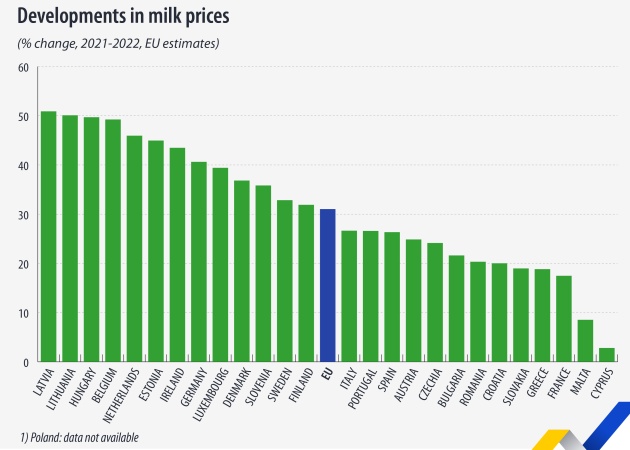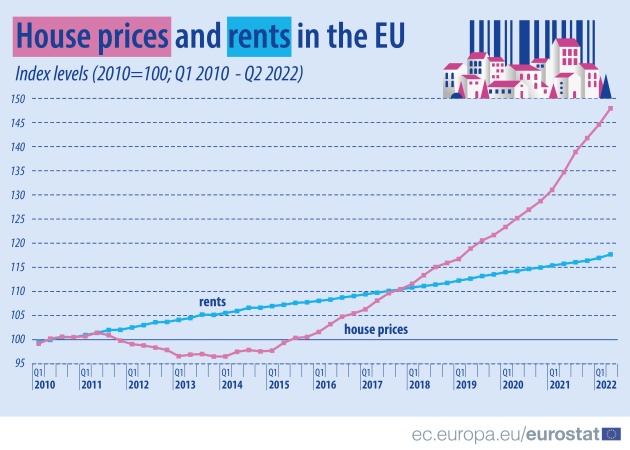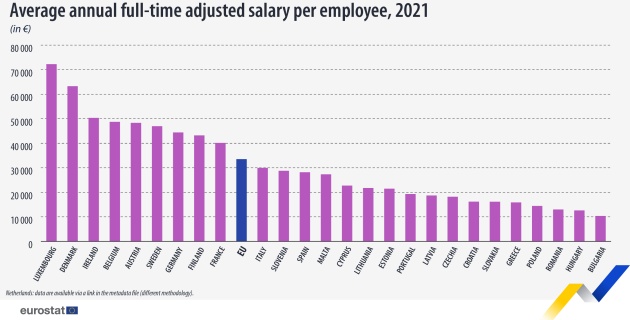Final statistics of 2022 confirm that most families have seen huge increases in products such as milk and cereals. A look at salaries and the access to housing shows massive inequalities between European Union countries.
![Shopping carts in a supermarket in Germany. / Photo: [link]Markus Spiske[/link], Unsplash, CC0.](https://cms.evangelicalfocus.com/upload/imagenes/63c680b124167_markus-spiske-wL7pwimB78Q-unsplashCropped.jpg) Shopping carts in a supermarket in Germany. / Photo: [link]Markus Spiske[/link], Unsplash, CC0.
Shopping carts in a supermarket in Germany. / Photo: [link]Markus Spiske[/link], Unsplash, CC0.
How much has the price of milk gone up? Across European Union countries, most families with children might respond to this question with resignation.
The answer is an average of 31% between December 2021 and 2022 - with countries like Latvia, Belgium, Hungary and Lithuania seeing the price of a litre jump over a 45%.
Alarming is also the cost of cereals (+45% average in Europe) and eggs (+43%). The most consumed kinds of meat (poultry, pigs, cattle) went up over 20% in Europe, and vegetables saw an increase of around 10%.

[photo_footer] Increase in the prices of milk in the European Union countries. / Graph: Eurostat [/photo_footer] This all adds up to the final inflation figures. In the countries using the Euro currency, it ended 2022 at a 9%. No country saw a general increase of prices below 5% (in previous years, the average was around 2%), and the population of the Baltic countries (Lithuania, Latvia and Estonia) was the one that witnessed the highest inflation data at levels between 17% and 20% last year.
These official figures shared by Eurostat (the European Union’s official statistical office) reflect the sudden impoverishment of the population in Europe, attributed to the crisis caused by the Russian invasion of Ukraine.
The latest statistics in the European Union confirm that other basic needs for families, such as housing, have beaten record highs. The price of houses have risen by an average of 48% since 2010. They more than doubled in Lithuania, Latvia, Czechia and Austria, while Estonia and Hungary saw the prices explode (+199% and +174%) in the same period.

[photo_footer] Evolution of the price of houses and rents, 2010-2022. / Graph: Eurostat [/photo_footer]
Renting a home has only become cheaper in Greece. The lack of apartment buildings in European cities has pushed the general price up without interruption in the last decade.
These realities explain in part the late age at which many leave their parent’s home. According to statistics of 2022, young people left their parental household on average at the age of 26.5 years. In Portugal, Greece, Slovakia, Austria, the median age was above 30. By contrast, Sweden (19 years), Finland and Denmark (21), recorded the lowest averages.
Comparing the salaries in Europe is almost impossible. The “income inequality”, as the EU describes it, is clear when the earnings in the West and East are put in the same graph.

[photo_footer] Full-time salarey per employee, European Union 2021. / Graph: Eurostat [/photo_footer]
In Denmark, the average annual salary for a full-time job is 63,300 euros, and 50,300 in Ireland. This income is five and even six times higher than that perceived in countries on the other side of Europe, like Bulgaria (10,300), Hungary (12,600) and Romania (13,000).
The average salary in the European Union is around 33,000 euros.
A more precise tool to compare the economic wellbeing of Europeans is the Purchasing Power Standard (PPS), which measures the “extent to which individuals have equal access to the goods and services produced within a national economy”.
According to this, Luxembourg, Netherlands, Austria and Germany (all above 23,000 PPS), are where people get more for their money. Southern and Eastern countries of the European Union were on the lower end: Romania, Bulgaria, Greece and Hungary (all below 10,000 PPS) and the places were it is most likely to suffer economic poverty.

[photo_footer] Where regular people have been most aware of the inflation is in their weekly purchases in supermarkets. / Photo: Unsplash, CC0.[/photo_footer]
Finally, a positive input. Unemployment continues to fall in the European Union. The figure of 6% at the end of 2022 is the best in the last fifteen years, showing a strong recovery after the Covid-19 financial crisis.
Nevertheless, the situation is not that good for those under the age of 25: 15% have no job (with an unemployment rate above 30% among young people in Spain and Italy).
[donate]

Las opiniones vertidas por nuestros colaboradores se realizan a nivel personal, pudiendo coincidir o no con la postura de la dirección de Protestante Digital.
Si quieres comentar o